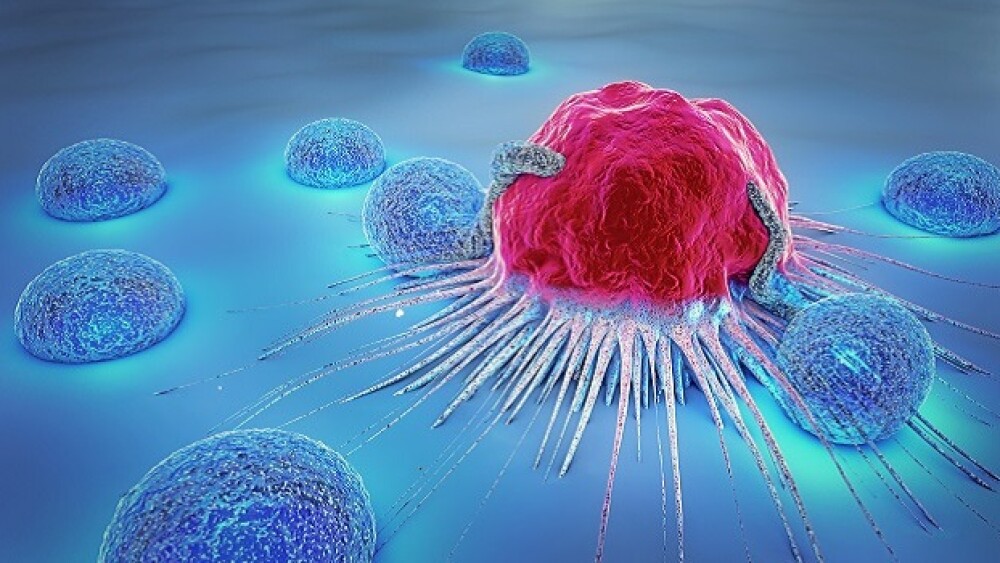ImmunoGen, released positive efficacy and tolerability data from its FORWARD II trial of its mirvetuximab soravtansine in combination with Merck’s Keytruda in platinum-resistant epithelial ovarian cancer (EOC). Shares jumped almost 12 percent in premarket trading.
ImmunoGen, based in Waltham, Massachusetts, released positive efficacy and tolerability data from its FORWARD II trial of its mirvetuximab soravtansine in combination with Merck’s Keytruda in platinum-resistant epithelial ovarian cancer (EOC). Shares jumped almost 12 percent in premarket trading.
ImmunoGen’s drug, IMGN853, is the first folate receptor alpha (FR-alpha)-targeting antibody-drug conjugate (ADC). The compound uses a FR-alpha-binding antibody that targets the ADC to FR-alpha expressing cancer cells along with an anti-tumor compound, DM4.
The combination was tested in 14 patients who were heavily pre-treated. In eight patients who expressed FR-alpha at medium or high levels, the confirmed overall response rate (ORR) was 63 percent, with a median progression-free survival (PFS) of 8.6 months. Out of the total 14 patients, the confirmed ORR was 43 percent with a median PFS of 5.2 months. In this group, the patients had already received a median of 4.5 prior lines of systemic therapy.
Patients receiving the full dose of mirvetuximab and Keytruda showed good tolerance for the drug, consistent with the safety profiles of each drug. As a result of the study results, ImmunoGen plans to test another 35 patients with medium or high FR-alpha expression levels.
“We are encouraged by the early evidence of anti-tumor activity with durable responses and the tolerability profile of mirvetuximab in combination with pembrolizumab, particularly among the subset of patients with medium or high folate receptor alpha expression where we saw the greatest benefit,” said Anna Berkenblit, vice president and chief medical officer of ImmunoGen, in a statement. “Across multiple combinations, we’ve demonstrated that our Phase III single agent dose level for mirvetuximab combines readily with other therapies. The consistency of these findings further underscores the potential of mirvetuximab for ovarian cancer—both as monotherapy, and in combination with other therapies in earlier lines of treatment.”
The results are being presented at the Society of Gynecologic Oncology (SGO) Annual Meeting in New Orleans from March 24-27.
The company provided year-end operating results and a pipeline report on February 9. In addition to evaluating mirvetuximab soravtansine in combination with Keytruda, it activated more than 100 clinical trial sites in North America and Europe evaluating the drug as monotherapy for platinum-resistant ovarian cancer. It is also evaluating IMGN779 in acute myeloid leukemia in a Phase I clinical trial and began dosing patients in a Phase I trial of IMGN632, a CD1123-targeting ADC that integrates a DNA-alkylating payload for several hematological cancers, including AML and blastic plasmacytoid dendritic cell neoplasm (BPDCN). The company also was informed that its partner, Takeda Pharmaceuticals, had filed an investigational new drug (IND) application for TAK-164, an ADC that uses ImmunoGen’s IGN platform.
Total revenues for the year, which marked a transition to a fiscal year ending December 31, were $115.4 million, compared to $48.6 million the previous year. Operating expenses were $174.4 million, compared to $184.3 million in 2016. The company reported a net loss of $96 million, or $0.98 per basic and diluted share for 2017. It ended the year with $267.1 million in cash and cash equivalents.
“We made significant progress with the business in 2017, with four consecutive quarters of strong execution across the company,” said Mark Enyedy, ImmunoGen’s president and chief executive officer, in a statement at the time. “Operationally, we advanced our monotherapy registration study and published compelling combination data with mirvetuximab, expanding our clinical pipeline, and established a high-value partnership with Jazz Pharmaceuticals supporting our earlier-stage programs. Financially, we added over $235 million in cash and eliminated roughly $100 million in debt on the balance sheet through business development and financing transactions.”





